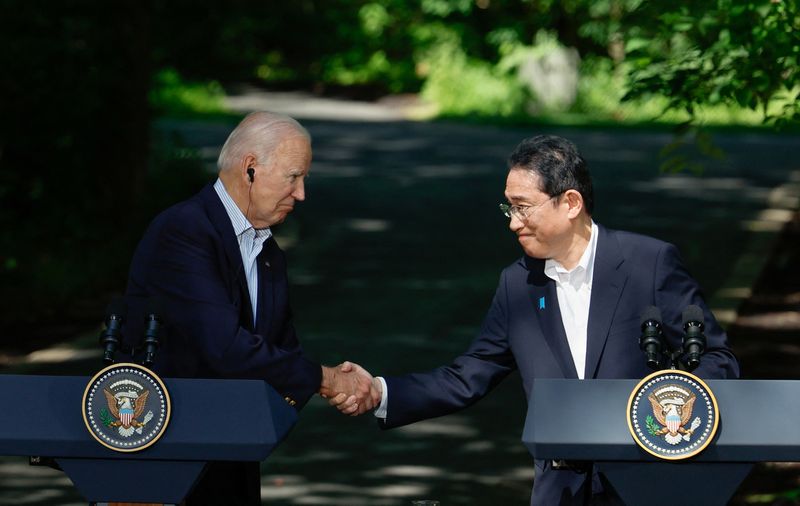By David Brunnstrom
WASHINGTON (Reuters) - The United States says next week's summit between President Joe Biden and Japanese Prime Minister Fumio Kishida will bring a "historic" upgrade in defense ties between the long-time allies.
On Wednesday in Washington, the leaders are expected to discuss plans to reform the U.S. military command in Japan to make it better able to function with Japanese forces in a crisis and to announce steps to allow more joint development, and potentially co-production, of military and defense equipment.
WHY DO THE COUNTRIES WANT TO IMPROVE MILITARY COORDINATION?
Japan and the U.S. confront a range of threats that call for closer coordination.
Topping the list is China's growing military and the threat it poses to Taiwan, just over 100 km (62 miles) from Japanese territory. Another is North Korea's nuclear and missile arsenal, and Russia's invasion of Ukraine and the fallout from Israel's war in Gaza are also shared concerns.
Japan plans to bring its own military under a new joint command structure by March 2025 and says it is in discussions about ways to strengthen cooperation with the U.S. and South Korea.
"The current security environment is tough and complex, and we are at a turning point in history," Kishida said in a group interview on Friday. "Cooperation between Japan and the United States and like-minded countries is a very important issue."
WHAT IS THE MILITARY UPGRADE?
Unlike in Japan's neighbor South Korea, where U.S. and South Korean troops can operate under a unified command of a four-star general, U.S. air, land and sea forces in Japan are currently under a three-star commander subordinate to the U.S. Indo-Pacific Command (Indo-PACOM.)
The arrangement dates back to a time when Japanese forces were concerned only with self-defense and the U.S. military considered the Asian country little more than a rest and resupply platform for operations elsewhere. It means commanders of U.S. forces in Japan have no strategic decision-making powers and that their authority is largely limited to managing bases and personnel, rather than working with Japanese counterparts.
Sources with knowledge of the planning have told Reuters Washington will consider appointing a four-star commander to match the rank of the head of a proposed Japanese Self Defense Forces (SDF) joint headquarters that will oversee all of Japan's military operations. Experts say a U.S. officer of that rank could lay the groundwork for a future unified Japanese-U.S. command.
WHEN MIGHT THE CHANGES TAKE PLACE?
Officials and experts familiar with the planning say that while the leaders will indicate the need to upgrade the command structure at the summit, details have yet to be finalized and would likely be left to a meeting of foreign and defense ministers later in the year.
Biden nominated three-star Air Force Major General Stephen Jost as the next commander of U.S. Forces Japan on March 25.
A senior Biden administration official told Reuters that Japan had consistently requested a proper counterpart to their joint command and the option to upgrade to a four-star was under consideration, but more work was needed on the issue.
"There's no question that the situation calls for a really empowered commander and a more operational structure," the official said.
HOW IMPORTANT IS JAPAN TO THE UNITED STATES?
Japan is often described as the most important U.S. ally in Asia and has become more important globally after a series of security law changes over the past decade that have moved it away from a U.S.-authored pacifist constitution that shaped its defense planning after defeat in World War Two.
The country hosts 54,000 American troops, hundreds of U.S. aircraft and Washington's only forward-deployed aircraft carrier strike group. Bases in Japan allow the United States to project military power across the region and hem in Chinese influence.
They would be vital should China move against Taiwan, a major worry for Japan given Taiwan's position in key trade routes and its production of cutting-edge semiconductors needed for the high-tech products Japan relies on to generate its wealth.
Japan has pledged to double defense spending to 2% of gross domestic product, which could make it the world's third-biggest military spender. Its plans include procuring hundreds of cruise missiles that can strike targets 1,000 km (620 miles) away.
Japan has also become important to the United States as a potential production base for munitions, including Patriot PAC3 anti-missile systems that will be re-exported to Ukraine, and for its shipyards, which are becoming key repair and refit yards for U.S. warships.
WHAT OBSTACLES ARE THERE TO CLOSER SECURITY COOPERATION?
Officials and experts have stressed the need for greater intelligence cooperation and in areas like cybersecurity. They say these remain a weak link given Japanese limitations in intelligence analysis and the need for better cyber defenses and stricter rules for guarding secrets.
U.S. Deputy Secretary of State Kurt Campbell, a key architect of U.S. Indo-Pacific policy, said this week the U.S. was encouraging Japan to do more to protect intellectual property and hold officials accountable for secrets. "It's fair to say that Japan has taken some of those steps, but not all of them," he said.
